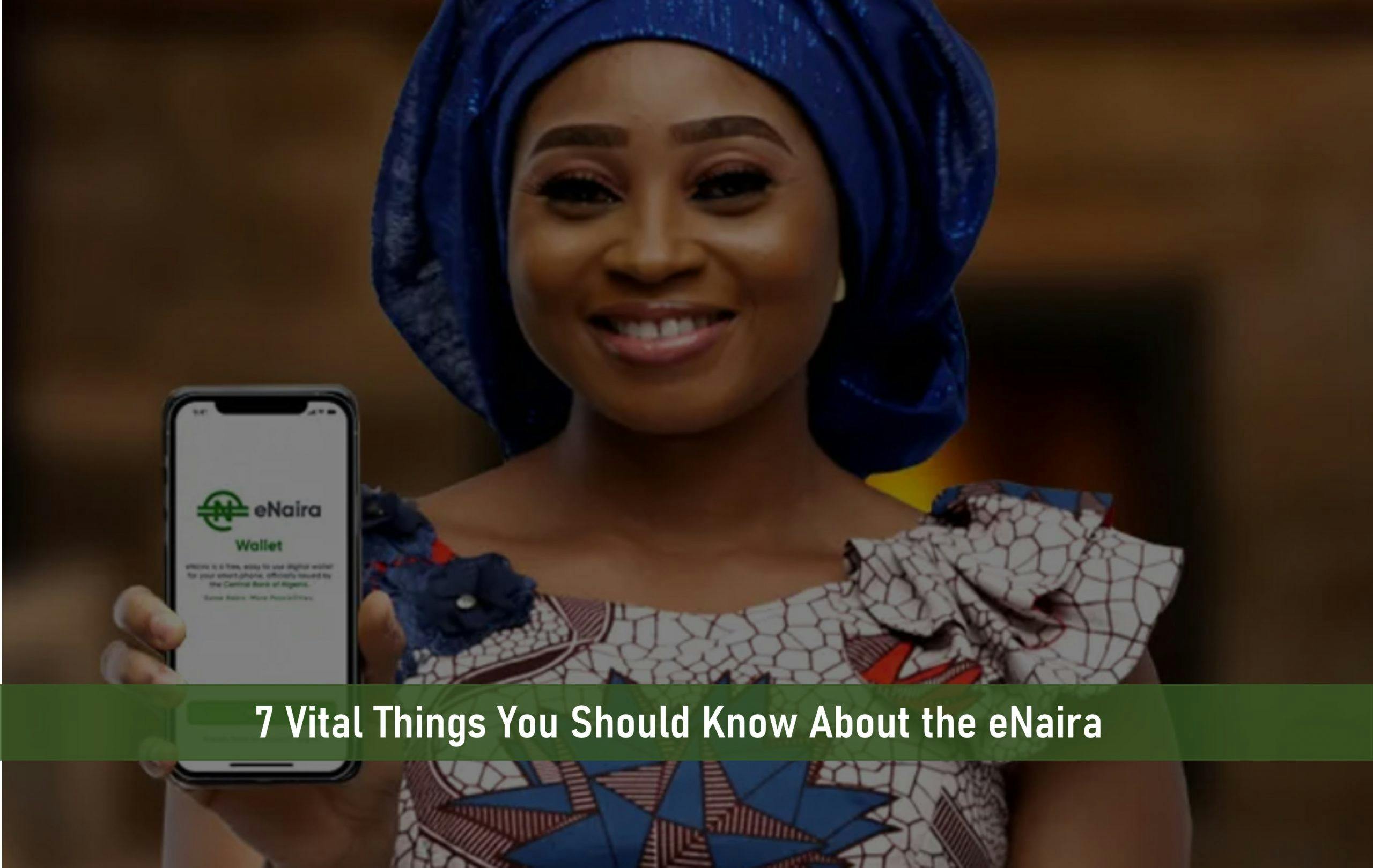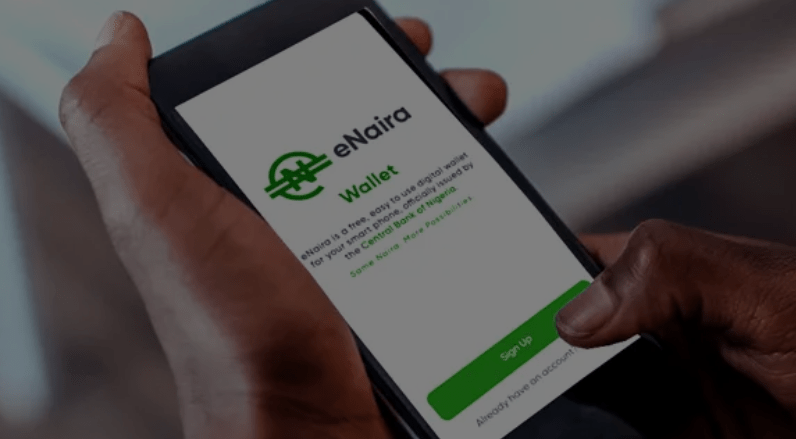
Nigeria on Monday, October 25, became the first country in sub-Saharan Africa to launch a digital version of its currency, eNaira, seeking to position itself in the face of the growing popularity of cryptocurrencies.
With the launch of the digital currency, Nigeria, Africa’s leading economy in terms of GDP and the most populous country on the continent (more than 200 million inhabitants), is a pioneer on the continent, alongside Ghana which has been testing the eCedi as a new medium of exchange since September.
“We have become the first country in Africa and one of the first in the world to introduce a digital currency for our citizens,” Nigerian President Muhammadu Buhari said at a press conference in Abuja.

Key Takeaways
• The eNaira aims to facilitate online exchanges, according to President Muhammadu Buhari.
• eNaira can be used for local and international trades.
• eNaira is universal, anyone can buy and hold it.
“Lately, the use of cash in doing business and making payments has declined,” he explained. A trend according to him “exacerbated since the start of the pandemic and with the birth of a new digital economy”.
The eNaira aims to facilitate online exchanges, according to the president, but should also “bring more and more people and businesses into the formal sector and thus increase the country’s tax revenues,” he added.
“As our slogan simply sums it up, the eNaira is the same as the naira but with many more possibilities. The eNaira, like its physical equivalent of the naira, is an official currency in Nigeria and is guaranteed by the CBN. The eNaira and the naira will have the same value and will always be exchanged at the rate of 1 naira for 1 eNaira, “Emefiele said.
In recent years, Central Banks around the world have been exploring ways to create digital versions of their currencies in the face of the growth in web-based payments, but also with the interest in cryptocurrencies, which are elusive, state control, or global regulators.
However, cryptocurrencies are very popular in Nigeria, ranked in 2020, the third user of virtual “currencies” in the world after the United States and Russia, by a study.
Economic Crisis
With cryptocurrencies, Nigerians are looking to break away from the constant depreciation of the naira in recent years. eNaira also makes it easier for Nigerians to receive money from other countries or to take their savings out of the country.
Unlike cryptocurrencies, the eNaira is indeed the digital equivalent of the Nigerian physical currency, the naira. It is issued by the central bank and therefore follows the official exchange rate.
Nigerians can download the eNaira app and fund their mobile wallets using their existing bank accounts.
Non-virtual Advantages
According to a Nigerian Newspaper, The Punch, 500 million eNaira have already been created and 33 banks have already been fully integrated into the online platform dedicated to this new currency. Other figures cited: more than 2.5 million people visit the website daily and 120 merchants have successfully registered on the platform.
The advantages offered by this currency are also detailed by The Nation: any customer who downloads the eNaira Speed Wallet application will be able to create their wallet, fund it with eNaira from their bank account, transfer eNaira from their wallet to another wallet, and make payment for its purchases from registered merchants.
Nigeria’s Central Bank says it will adopt the system after launch to encourage its use by people without access to banking services, especially in rural areas.
The launch of eNaira comes as Nigeria, Africa’s largest oil producer, faces the economic consequences of the COVID-19 pandemic and the drop in global crude oil prices in recent years.
After experiencing a second recession, five years after the start of the pandemic, the Nigerian economy has returned to growth. But inflation, especially the cost of food, remains very high and the naira low against the dollar.
Last year, China became the first major economy to launch a test version of a digital currency. Since then, at least five countries have launched their virtual currencies and 14 others, including Sweden and South Korea, are in the pilot phase according to the American think-tank Atlantic Council.
The governor of the Nigerian central bank argued that for eNaira, strict adherence to anti-money laundering and anti-terrorist financing standards would be ensured to preserve the integrity and stability of the country’s payment system.
7 vital things know about the eNaira
1. It’s traceable, so fraudulent activity can be easily traced.
2. It can be used for local and international trade.
3. It has a unique identity and security structure.
4. Trading is on a peer-to-peer basis.
5. It is universal, anyone can buy and hold it.
6. It does not increase, i.e It does not yield any interest.
7. Payments can be made by scanning QR codes.
How Will eNaira Benefit Nigeria and its Citizens?
There are many advantages to countries that accept digital currencies, but let’s see Nigeria and how it should benefit:
1. First, the country no longer needs to print so many notes. As a result, paper is saved.
2. It will improve the government’s ability to track funds. The government can see who sent the money, where it went and how it was spent.
3. It reduces the frictions and costs associated with traditional transfers and maintains a flexible monetary policy.
4. Provides smoother and faster operation. Citizens will benefit enormously because it supports financial inclusion.
5. This means that individuals and businesses can easily access valuable and affordable financial products and services.
6. Digital currency improves the efficiency of tax collection and payment systems and stimulates and accelerates cross-border transactions.
The Possible Downsides to eNaira
1. eNaira gives more control to CBN. The growing user base of Bitcoin and other cryptocurrencies is already a worrying concern among Nigerian financial regulators over the loss of control over the money supply. They see momentum as a threat to economic stability and money in general.
Some economists also believe that the CBN can run deficits and send funds directly to citizens without worrying about sovereign debt during tough economic times. In other words, the CBDC may present an obvious inflation risk.
2. The crude choice about the Nigerian digital currency is that it further centralizes money and retains the oligopolistic power of the CBN. Unlike crypto assets like Bitcoin and Ethereum (ETH, 2.03%), which aims to democratize and decentralize finance, Nigeria’s digital currency offers almost complete control over Nigeria’s bank.
The confidentiality and anonymity of transactions will be reduced as banks monitor and control transactions more tightly. Each transaction can be tracked, recorded, and analyzed using the digital tools provided by CBN.
Frequently Asked Questions
1. What is eNaira?
eNaira is the same as the naira but with many more possibilities.
2. How to get eNaira?
Download the eNaira app and fund your mobile wallet using any of your existing bank accounts.
3. Is ENaira a Cryptocurrency?
Unlike cryptocurrencies, the eNaira is indeed the digital equivalent of the Nigerian physical currency, the naira. It is issued by the Central Bank and therefore can be controlled by the govt as it adopts the country’s official exchange rate.
Final Thoughts
There are no commissions or currency exchange fees when using eNaira’s digital currency. Its advantage is that it significantly reduces transaction costs (since it uses a peer-to-peer model). In fact, in some cases, there is no transaction cost.
To use eNaira (for individuals and legal entities) only the eNaira mobile application is required. Once authentication is complete, you’re ready for fast, affordable, and secure cross-border transactions.
Read More




